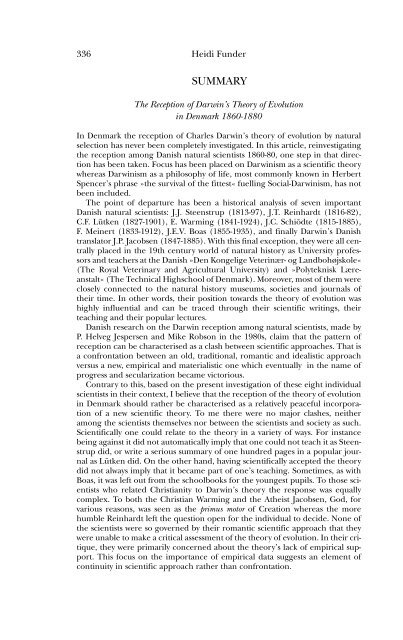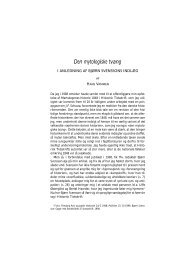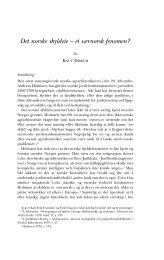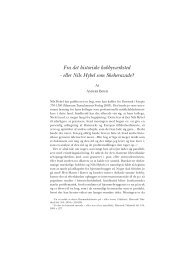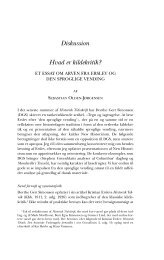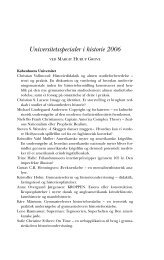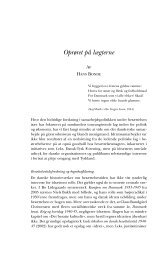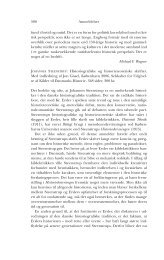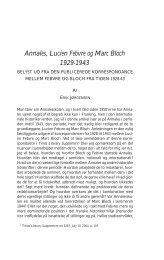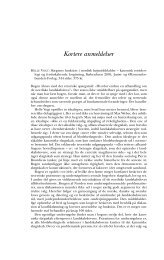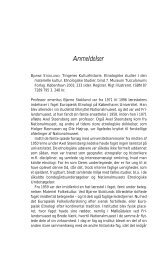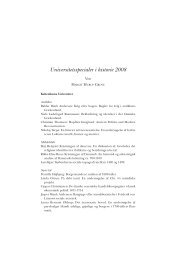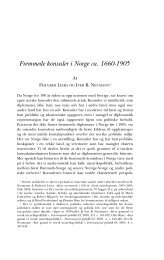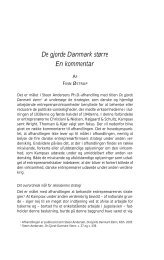En historie om foranderlighed - Historisk Tidsskrift
En historie om foranderlighed - Historisk Tidsskrift
En historie om foranderlighed - Historisk Tidsskrift
You also want an ePaper? Increase the reach of your titles
YUMPU automatically turns print PDFs into web optimized ePapers that Google loves.
336 Heidi Funder<br />
SUMMARY<br />
The Reception of Darwin’s Theory of Evolution<br />
in Denmark 1860-1880<br />
In Denmark the reception of Charles Darwin’s theory of evolution by natural<br />
selection has never been c<strong>om</strong>pletely investigated. In this article, reinvestigating<br />
the reception among Danish natural scientists 1860-80, one step in that direction<br />
has been taken. Focus has been placed on Darwinism as a scientific theory<br />
whereas Darwinism as a philosophy of life, most c<strong>om</strong>monly known in Herbert<br />
Spencer’s phrase »the survival of the fittest« fuelling Social-Darwinism, has not<br />
been included.<br />
The point of departure has been a historical analysis of seven important<br />
Danish natural scientists: J.J. Steenstrup (1813-97), J.T. Reinhardt (1816-82),<br />
C.F. Lütken (1827-1901), E. Warming (1841-1924), J.C. Schiödte (1815-1885),<br />
F. Meinert (1833-1912), J.E.V. Boas (1855-1935), and finally Darwin’s Danish<br />
translator J.P. Jacobsen (1847-1885). With this final exception, they were all centrally<br />
placed in the 19th century world of natural history as University professors<br />
and teachers at the Danish »Den Kongelige Veterinær- og Landbohøjskole«<br />
(The Royal Veterinary and Agricultural University) and »Polyteknisk Læreanstalt«<br />
(The Technical Highschool of Denmark). Moreover, most of them were<br />
closely connected to the natural history museums, societies and journals of<br />
their time. In other words, their position towards the theory of evolution was<br />
highly influential and can be traced through their scientific writings, their<br />
teaching and their popular lectures.<br />
Danish research on the Darwin reception among natural scientists, made by<br />
P. Helveg Jespersen and Mike Robson in the 1980s, claim that the pattern of<br />
reception can be characterised as a clash between scientific approaches. That is<br />
a confrontation between an old, traditional, r<strong>om</strong>antic and idealistic approach<br />
versus a new, empirical and materialistic one which eventually in the name of<br />
progress and secularization became victorious.<br />
Contrary to this, based on the present investigation of these eight individual<br />
scientists in their context, I believe that the reception of the theory of evolution<br />
in Denmark should rather be characterised as a relatively peaceful incorporation<br />
of a new scientific theory. To me there were no major clashes, neither<br />
among the scientists themselves nor between the scientists and society as such.<br />
Scientifically one could relate to the theory in a variety of ways. For instance<br />
being against it did not aut<strong>om</strong>atically imply that one could not teach it as Steenstrup<br />
did, or write a serious summary of one hundred pages in a popular journal<br />
as Lütken did. On the other hand, having scientifically accepted the theory<br />
did not always imply that it became part of one’s teaching. S<strong>om</strong>etimes, as with<br />
Boas, it was left out fr<strong>om</strong> the schoolbooks for the youngest pupils. To those scientists<br />
who related Christianity to Darwin’s theory the response was equally<br />
c<strong>om</strong>plex. To both the Christian Warming and the Atheist Jacobsen, God, for<br />
various reasons, was seen as the primus motor of Creation whereas the more<br />
humble Reinhardt left the question open for the individual to decide. None of<br />
the scientists were so governed by their r<strong>om</strong>antic scientific approach that they<br />
were unable to make a critical assessment of the theory of evolution. In their critique,<br />
they were primarily concerned about the theory’s lack of empirical support.<br />
This focus on the importance of empirical data suggests an element of<br />
continuity in scientific approach rather than confrontation.


